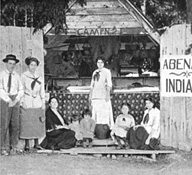Juror
Alanis Obomsawin
[Juror’s Statement]
To Hear Is to See
There will always be a need for documentaries. They are the place where the people can tell their stories.
I come from a nation that was guided by visions and dreams. The Abenaki, like all First Nations, has suffered a cultural shock. Starting in the early 1900s, for over 50 years, thousands of false stories were told on the screen, and later on television and many other places, not to mention the history books written about our people. Some scholars have called this period the “silent conspiracy.” That’s when a new tribe was born—the Hollywood Tribe—and our people became the Invisible Tribe.
The main responsibility of a documentary filmmaker is to gain the respect of those who share their stories. It is their life and every life is sacred. It is therefore fundamentally important to really listen. To hear is to see. At first I only record the voices of the people on a one-on-one basis. This allows the individual not to be distracted by the camera. Then when the time comes to film the people, there is already a relationship and a trust that is established because you have listened to their words. You have truly heard their stories.
When technology developed into filmmaking and television, some First Nations saw it as a threat to the spiritual world of our people. So much had been lost and some physical and ceremonial aspects of our lives are never to be filmed.
Since the early 1950s, many of us have worked hard to influence changes in the educational system and eventually in the world of documentary filmmaking. We now have a pool of talent capable of working professionally in all aspects of film and video production and radio broadcasting. For us it means we can transfer this power to the people so they can be heard the world over.
Alanis Obomsawin was born in New Hampshire in Abenaki territory, and moved to Odanak, Quebec when she was six months old. A member of the Abenaki Nation, she is one of Canada’s most distinguished documentary filmmakers, having made over thirty uncompromising documentaries on issues affecting Aboriginal people in Canada. The first film in her series about the 1990 Oka crisis, Kanehsatake: 270 Years of Resistance (1993, screened at YIDFF ’93), was a feature-length documentary about the 1990 Mohawk uprising in Kanehsatake and Oka; it has won eighteen international awards. Her National Film Board of Canada feature documentary, Waban-Aki: People from Where the Sun Rises, was launched in the fall of 2006. Her latest film is entitled Gene Boy Came Home (2007). For 38 years, Obomsawin has directed documentaries at the NFB with strong social content, inspired by the desire to let the voices of her people be heard. In 1983, she was made a member of the Order of Canada, in recognition of her dedication to the well-being of her people and the preservation of the First Nations’ heritage through her filmmaking and activism. |
Waban-Aki: People from Where the Sun Rises
 CANADA / 2006 / English, French, Abenaki / Color / Video / 104 min
CANADA / 2006 / English, French, Abenaki / Color / Video / 104 min
Director, Script, Producer: Alanis Obomsawin
Photography: Philippe Amiguet
Editing: Alison Burns
Sound: Raymond Marcoux, Ismaël Cordeiro
Music: Francis Grandmont
Executive Producer: Sally Bochner
Production Company, Source: National Film Board of Canada
Yvonne M’Sadoques rocks forward in her chair. She’s lived for over a century, in the Abenaki community of Odanak, and has no shortage of stories to tell. “The priest would march into our home and order us to stop dancing. We were going to the devil, he said.” She pauses, a humorous glint in her eye. “But you know—I don’t really believe in the devil. Do you?” M’Sadoques is in conversation with Alanis Obomsawin. Obomsawin’s illustrious career comes full circle with Waban-Aki: People from Where the Sun Rises. Having dedicated nearly four decades to chronicling the lives of Canada’s First Nations, she returns to the village where she was raised to craft a lyric account of her own people.
